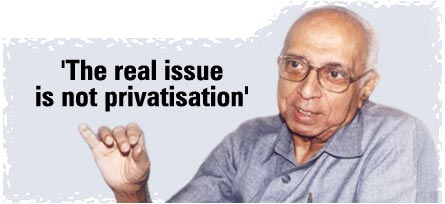
The concluding segment of former Divestment Commission chairman G V Ramakrishna's interview with Contributing Special Correspondent Shobha Warrier.
Part I: 'Divestment money wasn't used for rural development'
With the Left parties announcing that the profit-making PSUs will not be divested or privatised, the market reacted adversely. Are you for the divestment of profit-making PSUs?
Everybody says PSUs (public sector units) should grow like global companies in a competitive environment. Compared to a private company, a PSU has several disadvantages.
Do you know the salary of the head of the largest public sector company is less than the salary of a raw graduate coming out of an IIM? So, you have to provide incentives and also disincentives. You start hire and fire at the highest level.
You have to give autonomy to the pubic sector companies. But who will use the power if it lands the management in trouble?
There are five entities that oversee a PSU. The first is the ministry and the officials in the ministry.
The second is the committees of Parliament: the Public Undertaking Committee, the Public Accounts Committee and Standing Committee on Public Enterprises.
The third is the Comptroller and Auditor General.
Then there is the Central Vigilance Committee, and lastly, the Central Bureau of Investigation.
With all these five people sitting on their head, who would use any autonomy and take all the risks of being pulled up by any of these agencies?
Is that the reason why the performance of even the profit-making PSUs is much below that of private companies?
Partly that, but the lack of incentives is also there. They have all the disadvantages compared to a private company. To compete in the market, you have to take quick decisions, you have to be nimble-footed, you have to take commercial decisions that entail some risks.
The public sector structure does not permit all this. We are asking the public sector to compete with the private sector with one hand tied behind its back.
Today, you have the Navaratnas, but no freedom has been given to them.
Should the government start divesting profit-making PSUs because private parties will be interested only in them?
I wouldn't say all profit-making PSUs. I said in the report itself to keep out 20, 25 companies.
The real issue is not one of privatisation. The government can raise money by sale of shares to the public, but to get good value they have to get the company out of government control. This can be done by transferring the residual shares of below 51 percent to the National Shareholding Trust to make them non public sector companies.
As long as the government does not want to let go of the public sector companies they will not get value for their shares and the companies will not grow in such a competitive environment. It will be a national loss.
Why did you suggest that some profit-making PSUs must not be divested?
Firstly, because they are already doing well, and some of them have widely held shares in India. For example, in Hindustan Petroleum Corporation, the government holds only about 51.5 percent equity. The remaining 48.5 percent is already out of government hands.
The oil companies hold the balance between foreign companies and private companies. They cannot compete if one of their hands is tied behind their back.
So, you remove all that, let them be professionally managed and then they can grow as well as the private sector.
In Singapore they have a body called Temasek which holds the shares of government in over 100 companies. The companies are not under parliament's control or a ministry control on a day-to-day basis. Temasek sends an annual report to the finance minister in Singapore. So, they are independent. The government people are in, private people are in and the public sector is in.
So you have a good example of companies being managed outside government control.
Share prices will not go up if the government manages a company. Why did the share market go down on the PSU stocks when the government said 'no privatisation'? If you say we are not going to privatise, but create an NST (National Shareholding Trust) and treat them de facto like privately owned companies, their share values will go up.
But various ministers say the PSUs under their respective ministries will not be divested or privatised.
It is for the government to come out with a policy. We don't know how the policies will go. Such matters are decided by a Cabinet committee. My suggestion is, merely by paying lip sympathy, public sector companies will not grow; not unless they let go of government control. I am not saying 'Hand them over to the private sector!' -- they are strategic companies which will be held broadly by the people. But they should be allowed to be managed independently. Then they will grow.
There are more than 100 sick central PSUs in India. Who will be interested in buying them? What should the government do before trying to sell them?
These companies have their origins different from each other. Some of them were taken over from the private sector when they became sick. Some other companies were started in the fifties for political reasons without economic justification. These are in the sick category and each case has to be dealt with separately.
Some others, like NTPC, BHEL, IOC NALCO, MTNL, were started by the government and have done very well Many states competed with each other to get these companies to their states. They offered incentives, including huge tracts of land. If the company wanted 50 acres, the states offered 200 acres. This prime land fetches a lot of money now.
The NPV (net present value) method should not be applied blindly. Total valuation should take into account the market value of the land apart from the NPV of the going concern. There are doubts whether this has been done in the case of the recent privatisations.
Another thing is that technological restructuring is needed in these companies, like modernisation of equipment. Managerial change can turn around a marginally sick company provided they let it go out of government control.
A major impediment to the growth of the public sector in India has been government control. If they don't let go, it is futile to talk about autonomy, modernisation, etc. But getting the government out need not necessarily mean handing it over to a private party or creating a private monopoly.
Because of the fear of the anti-incumbency factor, governments are compelled to take populist measures. Earlier it used to be said that difficult decisions can be taken soon after elections and there can be scope for populist measures before the elections. Now the situation is different and elections come every one or two years in one state or the other.
With the regional parties being a part of the central government, they are worried about elections coming more often and the anti-incumbency factor operating. So one can see populist policies becoming somewhat endemic.
There is a report that says all state government PSUs are running in huge losses.
Do you know almost every state had a divestment commission? They used to discuss with me about divestment when I was the chairman of the Divestment Commission. These are small enterprises and have been sick for some time. It is difficult to find buyers even for former good companies like NGEF (New Government Electrical Factory) in Bangalore. The state governments have to cut their losses as much as possible in a practical and transparent way.
You wrote in one of your columns that divestment is only a part of the whole process of the reform process of the PSUs.
Like I said earlier, the bigger problems are ministerial control, the control of the CBI, CAG, etc. That is why I said, hand over the shares to a National Shareholding Trust. If a PSU is under government control, share value will not be good. That is why the moment you say 'yes' to privatisation, share values go up.
The way the market is going down, do you expect it to go up at any point of time in the immediate future?
I don't predict the market. I have never traded in the share market myself. I never bought or sold a share myself. It is not easy always to say markets are manipulated. The FIIs (foreign institutional investors) have sold Rs 8,500 crore (Rs 85 billion) worth shares from May 14 onwards till today. You cannot say it is manipulated because they invest all over the world. However, in some circumstances there can be manipulation which has to investigated by SEBI.
Photograph: Sreeram Selvaraj
Image: Uday Kuckian







